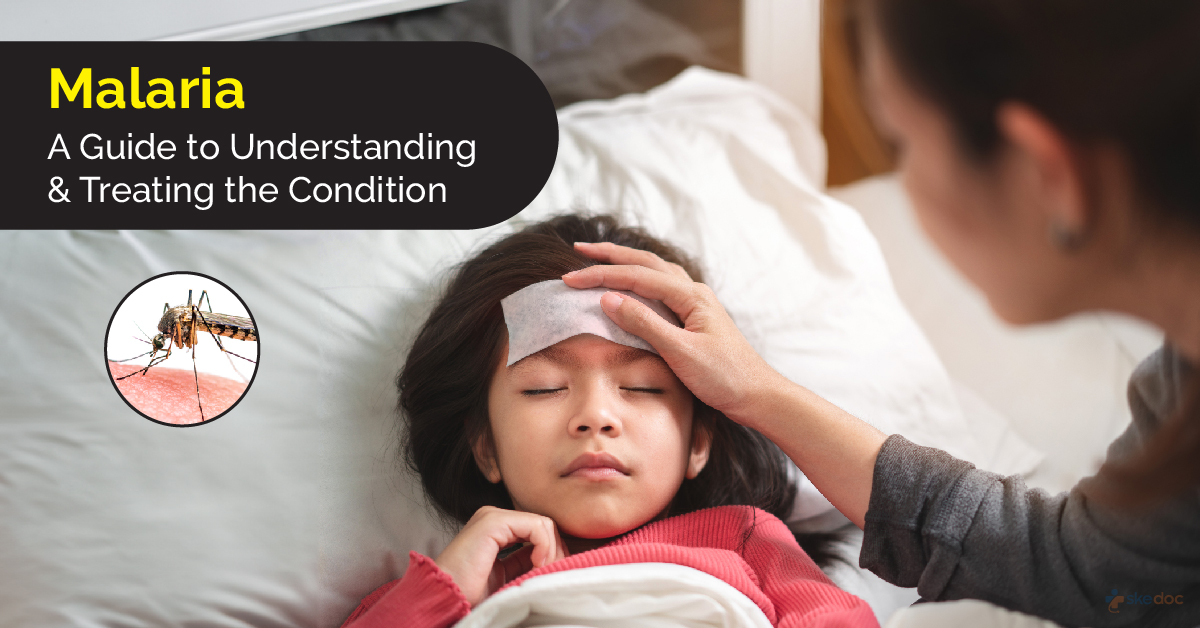Allergy
Blood Diseases
Bone & Joints
Brain
Cancer
Child Care
Cosmetic Surgery
Diabetes
Endocrinology
ENT
Eye
Gen Medicine
General Surgery
Heart
Kidney
Lifestyle
Liver & Digestive
Lung
Men’s Health
Mental health
Physiotherapy
Rheumatology
Skin and hair
Sleep Disorders
Spine
Transplant
Women Health
Thyroid
Vascular Surgery
Malaria

What is Malaria?
Malaria is a mosquito-borne infectious disease characterized by fever, chills, vomiting, and headaches.
Is Malaria a medical emergency?
Malaria is sometimes fatal and can be a medical emergency.
Types
Different types of malaria are as follows:
- Algid Malaria: This is caused by plasmodium falciparum. It affects the cardiovascular system.
- Bilious Malaria: This is caused by plasmodium falciparum. It affects the liver and causes vomiting and jaundice.
- Cerebral Malaria: This is caused by plasmodium falciparum. It affects the cerebrum (brain).
- Congenital Malaria: This is caused by various plasmodia parasites. It is transmitted from the mother to the fetus.
- Pernicious or falciparum or plasmodium falciparum Malaria: This is caused by plasmodium falciparum.
- Plasmodium Ovale Malaria: This is caused by plasmodium ovale.
- Quartan or Plasmodium Malariae Malaria: This is caused by plasmodium. This attacks every fourth day.
- Quotidian Malaria: This is caused by plasmodium falciparum, plasmodium vivax, and plasmodium knowlesi. It attacks daily.
- Tertian Malaria: This is caused by plasmodium falciparum, plasmodium ovale, and plasmodium vivax. It attacks every third day.
- Transfusion Malaria: This is caused by various plasmodia parasites. It is transmitted through blood transfusion or the sharing of needles and syringes.
- Vivax or plasmodium vivax Malaria: This is caused by plasmodium vivax.
This is further classified into two types depending on the severity of the symptoms. They are:
- Severe Malaria: Symptoms of fever, headaches, vomiting associated with seizures, decreased consciousness, weakness, breathing problems, low blood pressure, kidney failure, etc.
- Uncomplicated Malaria: Symptoms of fever, headaches, and vomiting
Causes
It is caused by a microscopic parasite called Plasmodium. Mosquitoes get infected with these parasites. They are passed into the human blood through mosquito bites. These parasites enter the liver, reproduce and then release into the bloodstream. The female anopheles mosquito is the most common mosquito that is responsible for the transmission of disease.
It can be transmitted through blood, so the other forms of catching the disease may be through:
- Blood transfusions
- Sharing needles and syringes
- Organ transplantation.
- An infected mother can spread the disease to the child during pregnancy
Risk factors
Factors that influence the development of disease are:
- Residing or visiting the regions where the disease is common.
- Age - Infants, young children, and elderly people are at a greater risk of disease
- Pregnant women
Signs & symptoms
Signs and symptoms of the disease begin 10 to 15 days after being bitten by an infected mosquito. Symptoms include:
- Fever
- Chills and shivering
- Weakness
- Vomiting
- Headaches
- Muscle pains
- Abdominal pain
This disease attack starts with chills, shivering, fever, sweating, and finally returning to normal body temperature. These episodes repeat every 36 to 48 hours.
Investigations
Blood tests are performed to diagnose this disease. These are microscopic examinations of blood using blood films. Different types of blood tests are performed for the following reasons which are:
- To confirm the diagnosis of the disease
- To identify the kind of Malaria parasite
- To identify if the condition is causing any other severe complications like anemia or damage to other organs
Antigen-based rapid diagnostic tests (RDT): These are also performed to diagnose disease. These tests use finger-stick or venous blood. The results are available within 15 to 20 minutes.
Diagnosis
The diagnosis is made based on reviewing the signs and symptoms, physical examination findings, and considering the results of the blood tests.
Treatment options
This is treated by considering the following factors:
- The type of Malarial parasite causing the symptoms
- The severity of the symptoms
- Age of the individual
- Whether the individual is pregnant
Medical treatment
Malaria is treated with anti-malarial drugs, usually a combination of one or more anti-malarial drugs. Artemisinin is the primary anti-malarial drug to treat disease. Artemisinin-based combination therapies (ACT) refer to combining two or more drugs.
Additional anti-malarial drugs include:
- Atovaquone plus proguanil
- Doxycycline
- Mefloquine
- Primaquine phosphate
Role of diet/ Exercise/ Lifestyle changes/ Preventive measures
Preventive measures for this disease may include:
- Using mosquito repellents and mosquito nets during rest
- Wearing clothes that fully cover the skin
- Keeping the environment clean without excess garbage or water stagnation
- Shutting windows and door screens to avoid mosquitoes entering indoor spaces
- Certain medications are prescribed to prevent disease. They are usually taken before, during, and after a trip to Malaria-endemic regions.
Complications
This can cause serious and life-threatening complications. They include:
- Cerebral Malaria: This parasite affects the brain's blood vessels, causing brain damage and swelling. This results in seizures and coma
- Anemia: This parasite damages the red blood cells and causes anemia
- Organ failure: It damages organs like the liver, spleen, and kidneys and can lead to life-threatening conditions
- Hypoglycemia: It causes low blood sugar, which can lead to coma and death
- Disease in pregnant women can cause abortion, low birth weight, and stillbirth.
Prognosis
If diagnosed and treated early, the prognosis is good. Nevertheless, it can lead to severe complications in a few cases. In such instances, the prognosis is critical.
When to contact the doctor? / How to identify the complications?
Immediate medical attention is warranted after noticing any signs and symptoms.
Indications for hospitalization if required
Hospitalization is required for the treatment of Malaria.
Suggested clinical specialists/ Departments to consult for this condition
- Infectious disease specialist
Was this article helpful?
YesNo
Comments





